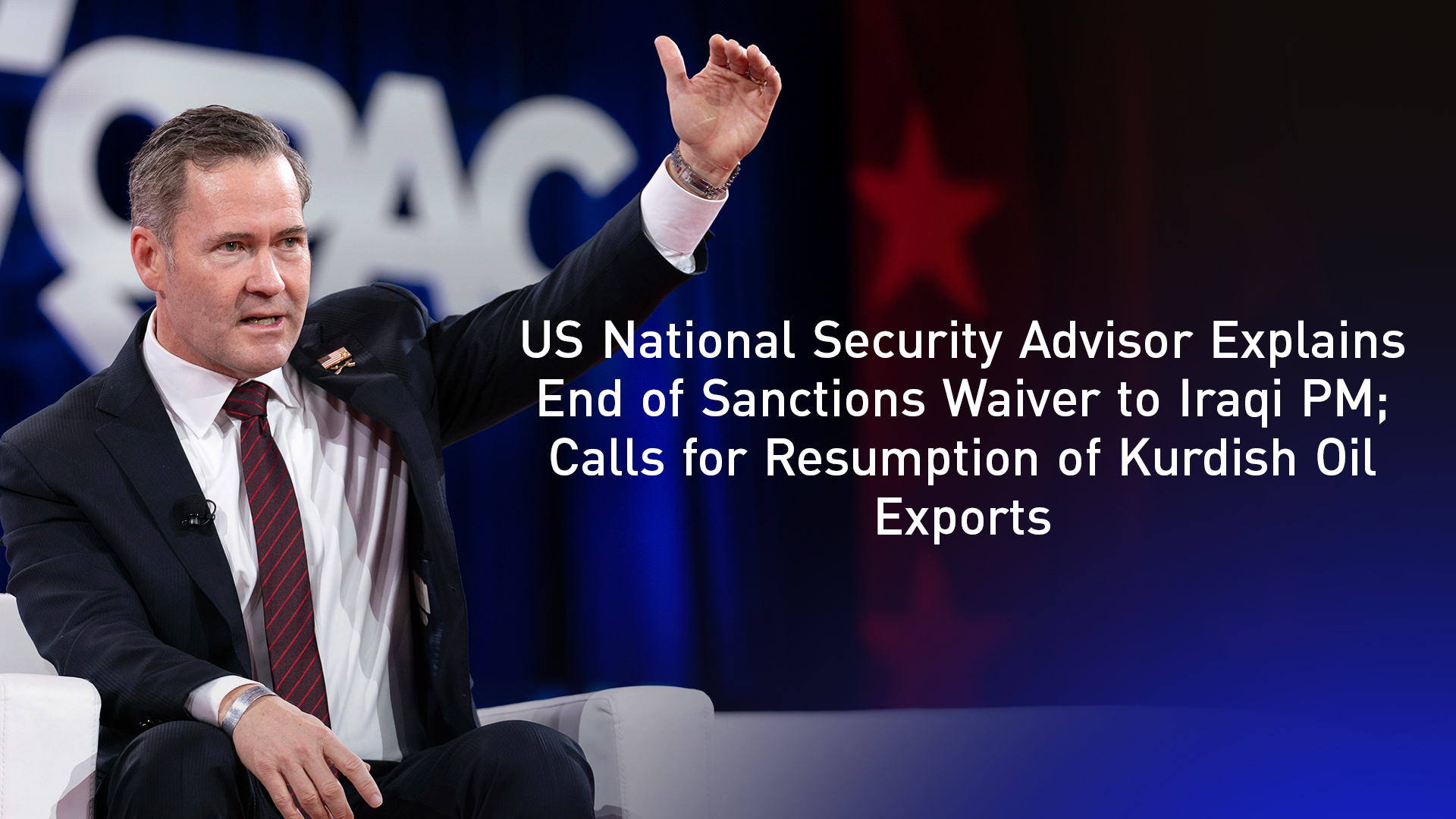US National Security Advisor Explains End of Sanctions Waiver to Iraqi PM; Calls for Resumption of Kurdish Oil Exports
Waltz “urged the Iraqi government to work with the Kurdistan Regional Government to address remaining contract disputes and pay arrears owed to U.S. energy companies,”

WASHINGTON DC, United States (Kurdistan 24) - U.S.National Security Advisor Michael Waltz spoke with Iraqi Prime Minister Mohammed Shia al-Sudani on Sunday. Later that day, Waltz posted a summary of their conversation to X.
U.S. officials do not ordinarily work on Sundays, so the discussion was a bit unusual.
In addition, Waltz’s post marks the first comprehensive U.S. statement about this issue. U.S. officials have made comments to journalists, but by the very fact that others—and not U.S. officials—relayed the administration’s position, the full, formal U.S. policy was not clear, although the issue is of vital importance.
This consideration adds yet further significance to Waltz’s read-out of his discussion with Sudani.
In that conversation, Waltz stressed three main points: 1) the end of the sanctions waiver was due to President Donald Trump’s “maximum pressure” campaign on Iran; 2) Baghdad needs to do its part to facilitate the resumption of Kurdish oil exports; and 3) the U.S. wants to maintain strong ties with Iraq and develop them further.
Until Saturday, Iraq had a sanctions waiver that allowed it to purchase electricity from Iran. On Saturday, as the waiver expired, the Trump administration did not renew it.
Maximum Pressure on Iran
One of Trump’s first actions in his second term was to issue an executive order restoring the “maximum pressure campaign” on Iran from his first term.
In his discussion with Sudani, Waltz explained that was the factor behind the U.S. decision not to renew the sanctions waiver.
“Mr. Waltz noted that the decision to not renew the waiver of sanctions on Iranian electricity exports was consistent with President Trump’s ‘maximum pressure’ strategy on Iran,” Waltz’s post said.
Moreover, “pressure on Iran would increase if Iran continued to develop a nuclear weapons capability and support terrorism across the region, including in Iraq,” it added.
The Renewal of Kurdish Oil Exports
Waltz also raised the issue of resuming Kurdish oil exports through the Iraq-Turkey pipeline. Those exports have been suspended since March 2023. For some time, it has seemed that their resumption has been imminent. As recently as Thursday, Iraq’s Oil Minister said they would start again soon.
Read More: Iraq’s Oil Minister: Iraq-Turkey Pipeline to Resume Operations Soon
Nonetheless, there always seems to be some unresolved bureaucratic issues, and Waltz took up that matter.
Waltz urged Sudani to have his government “work with the Kurdistan Regional Government to address remaining contract disputes and pay arrears owed to U.S. energy companies,” his post said.
Further Developing U.S.-Iraqi Relations
Waltz struck a friendly tone with Sudani. He began by wishing him “a Ramadan Kareem,” as his post noted, while he “expressed his concerns regarding the recent flooding in Baghdad.”
Read More: Baghdad Struggles with Torrential Rainfall as Floodwaters Rise Across Iraq
But Waltz also went beyond niceties. He “emphasized the importance of moving towards a win-win relationship based on mutual security interests and enhanced trade,” his post continued.
He also “welcomed the Iraqi Prime Minister’s efforts to achieve energy independence for Iraq, and encouraged the Iraqi government to welcome more western and U.S. energy companies into Iraq’s oil and gas sectors,” it added.
And it concluded, “The National Security Advisor thanked the Prime Minister for his commitment to the bilateral U.S-Iraqi relationship, and emphasized the Trump administration’s commitment to deepening energy and economic ties between the two countries to benefit both the American and Iraqi peoples.”